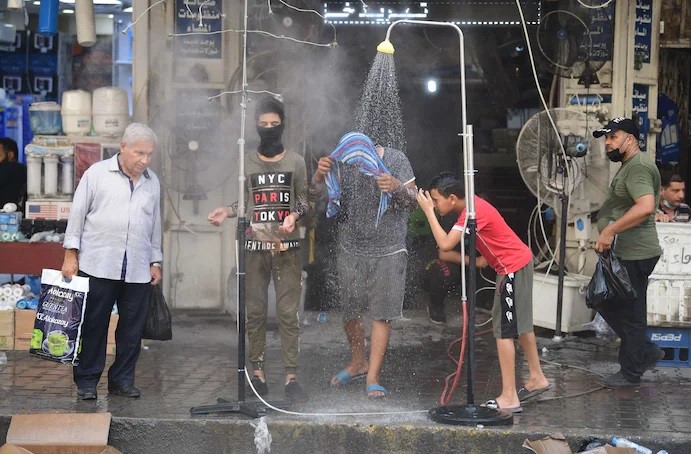ILO calls for risks mitigation of working under extreme heat in Iraq

Men cooling off under a public shower at a street in central Baghdad. Photo: Shutterstock
Baghdad (IraqiNews.com) – The International Labour Organization (ILO) in Iraq called on its tripartite partners – the government, employers’ and workers’ organizations – to ensure that appropriate measures are taken to mitigate some of the risks associated with working under extreme heat where temperatures in Iraq rise up to 50 degrees Celsius (122 Fahrenheit), according to a press statement issued by the ILO.
The extreme heat is increasing concerns in relation to the Occupational Safety and Health (OSH) conditions of workers, especially those employed in construction and agriculture – a sector which is already considered as one of the most hazardous in the world, the ILO statement mentioned.
According to the recent Labour Force Survey, one in four workers in Iraq is employed either in construction or agriculture – an extremely significant number, according to the ILO statement.
The ILO released a report in 2019 which stated that the higher heat levels caused by climate change threaten progress towards decent work by leading to a deterioration of working conditions and undermining the security, health and well-being of workers, the statement added.
Workers in some parts of the country have been given time off due to the heat. Yet, for workers who cannot afford to miss a day of work, such as those in informal, temporary, seasonal or day labor, measures must be taken to ensure their protection, the statement clarified.
On the practical level, this could include ensuring workers are provided with appropriate clothing, access to drinking water and shaded areas; and are encouraged to work during cooler hours with appropriate break times. It also includes ensuring that legislation related to OSH are being enforced through labor inspections – especially in sectors which face most risks, the ILO statement elaborated.
Iraq has ratified a number of ILO Conventions which focus on the needs to ensure protection for workers in different sectors, and most recently through the ratification of the Safety and Health in Agriculture Convention, 2001 (No. 184), which re-affirms the country’s commitment to decent work and International Labor Standards, the ILO statement added.
